MercoPress. South Atlantic News Agency
Bolivia ups measles vaccination with Brazilian donation
 “This week, all departments will have the vaccines,” Minister Castro said
“This week, all departments will have the vaccines,” Minister Castro said Bolivian health authorities expanded the age target for the nationwide measles vaccination campaign following an outbreak of the disease and the receipt of some 600,000 doses donated by the Brazilian Government. Ambassador Américo Dyott Fontenelle highlighted the importance of bilateral cooperation in this initiative.
Hence, the second phase of its mass measles vaccination campaign targets children and adolescents aged 1 to 14 after a shipment consisting of 300,000 SR and 300,000 SRP doses arrived in Santa Cruz. The vaccination effort aims to immunize over half a million young people, with specific allocations for ages 1-9 and 10-14, prioritizing schoolchildren. As of Sunday, Bolivia has reported 119 confirmed cases of measles, of which 98 are in Santa Cruz, 10 in La Paz, 4 in Potosí, 3 in Beni, 2 in Chuquisaca, 1 in Oruro, and 1 in Pando.
Health Minister María Reneé Castro urged parents to take their children to health centers or welcome mobile vaccination brigades. “From here, we will begin the nationwide distribution of these vaccines, so that this week all departments will have the vaccines and we can continue with the vaccination program,” she explained. ”These vaccines, which have already entered the cold chain following all established protocols, will begin to be distributed tomorrow (Monday) to the nine departments of the country in refrigerated trucks. Therefore, the Departmental Health Services must be ready to receive these important doses,“ she added.
In Cochabamba, health authorities have established 40 medical centers, including first and second-level facilities and the bus terminal, to provide free vaccinations against both influenza and measles. This expansion is a response to rising influenza cases and the potential for a measles resurgence. ”The influenza vaccine is now available to the entire population, with no age restrictions,” said Andrea Valdivia, director of First Level Hospitals, who urged the vulnerable population in particular to go to the vaccination sites, requiring only an identity card and no cold symptoms. First-level health centers operate Monday through Friday, with some comprehensive centers extending hours to include Saturdays.
The bus terminal also offers vaccination services. This strategy aims to prevent overcrowding at major hospitals by prioritizing vaccination in peripheral centers. The Ministry of Health has supplied Cochabamba with 45,000 influenza vaccine doses, with approximately 150 people being immunized daily across the various sites.




Top Comments
Disclaimer & comment rulesCommenting for this story is now closed.
If you have a Facebook account, become a fan and comment on our Facebook Page!